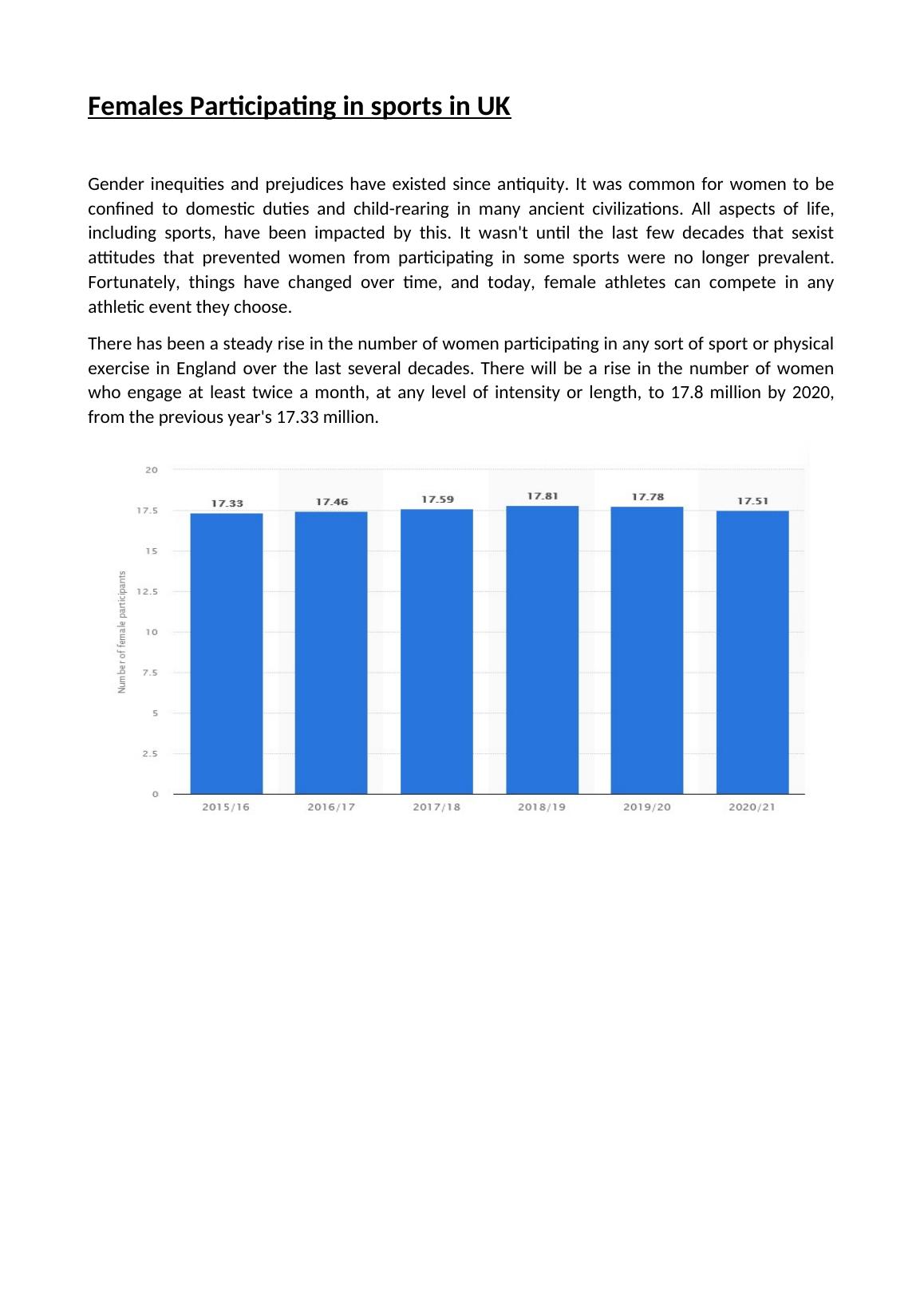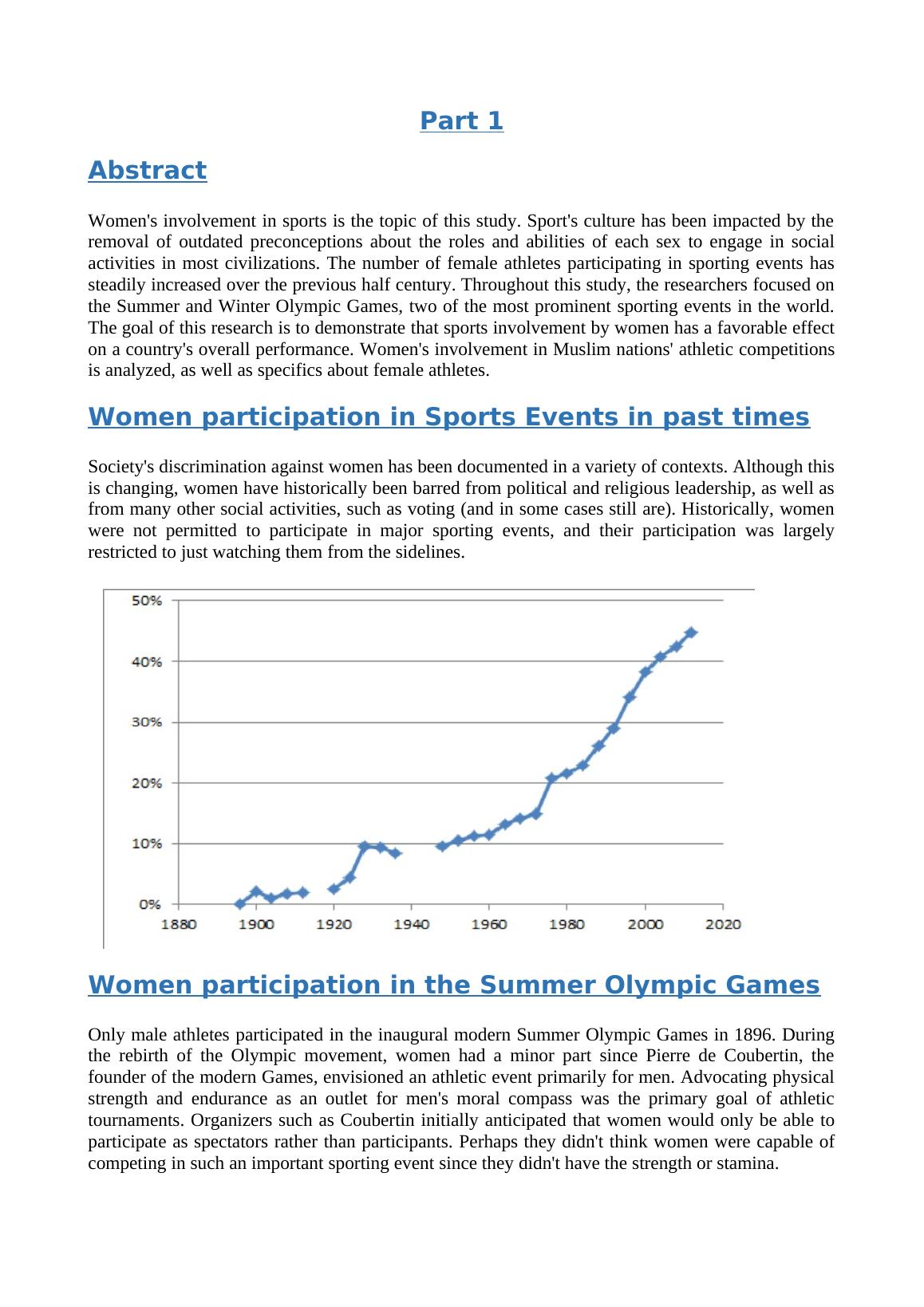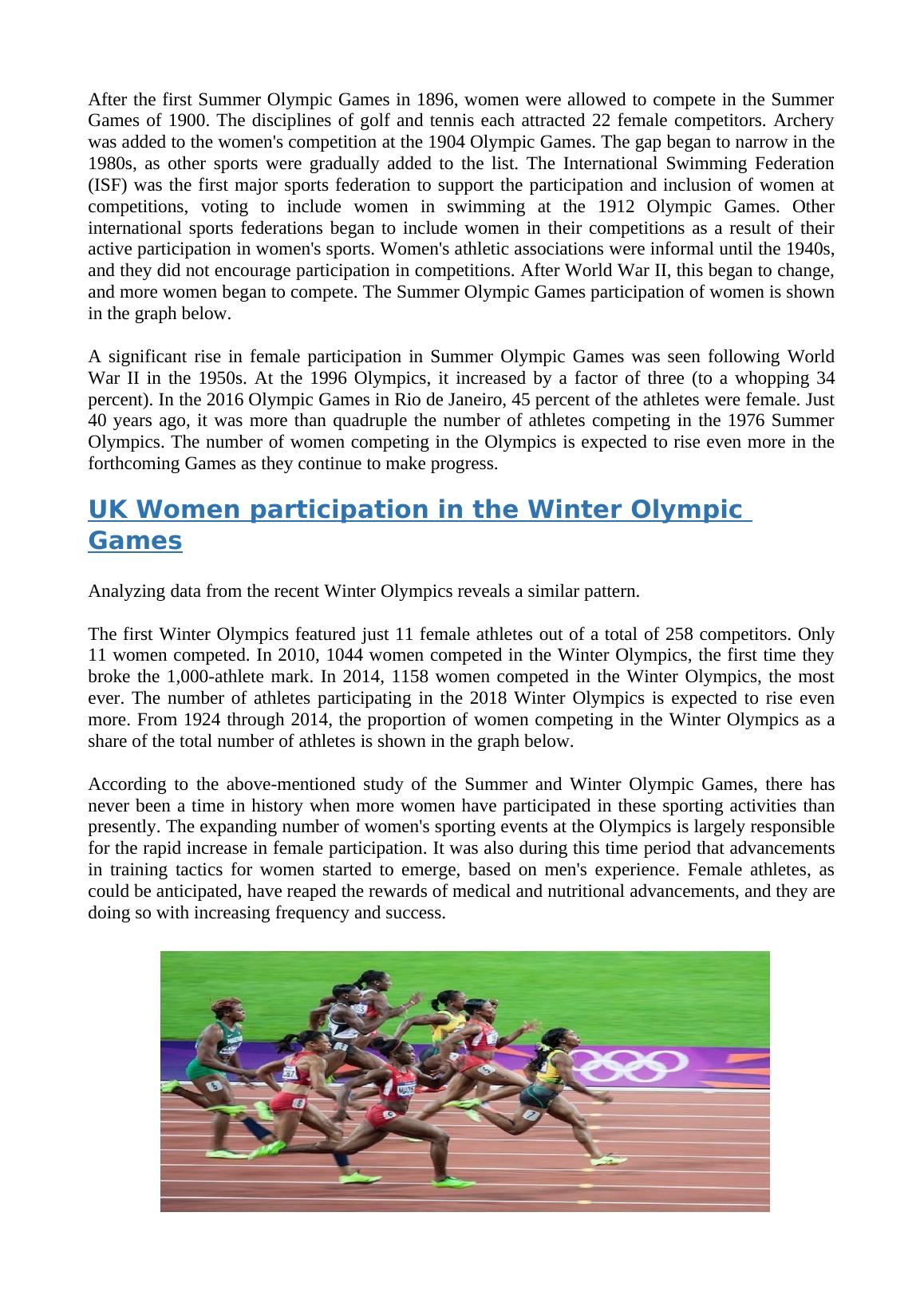Case Study on Women's Involvement in Sports in UK
Added on 2022-05-17
10 Pages2875 Words26 Views
Females Participating in sports in UK
Gender inequities and prejudices have existed since antiquity. It was common for women to be
confined to domestic duties and child-rearing in many ancient civilizations. All aspects of life,
including sports, have been impacted by this. It wasn't until the last few decades that sexist
attitudes that prevented women from participating in some sports were no longer prevalent.
Fortunately, things have changed over time, and today, female athletes can compete in any
athletic event they choose.
There has been a steady rise in the number of women participating in any sort of sport or physical
exercise in England over the last several decades. There will be a rise in the number of women
who engage at least twice a month, at any level of intensity or length, to 17.8 million by 2020,
from the previous year's 17.33 million.
Gender inequities and prejudices have existed since antiquity. It was common for women to be
confined to domestic duties and child-rearing in many ancient civilizations. All aspects of life,
including sports, have been impacted by this. It wasn't until the last few decades that sexist
attitudes that prevented women from participating in some sports were no longer prevalent.
Fortunately, things have changed over time, and today, female athletes can compete in any
athletic event they choose.
There has been a steady rise in the number of women participating in any sort of sport or physical
exercise in England over the last several decades. There will be a rise in the number of women
who engage at least twice a month, at any level of intensity or length, to 17.8 million by 2020,
from the previous year's 17.33 million.

Part 1
Abstract
Women's involvement in sports is the topic of this study. Sport's culture has been impacted by the
removal of outdated preconceptions about the roles and abilities of each sex to engage in social
activities in most civilizations. The number of female athletes participating in sporting events has
steadily increased over the previous half century. Throughout this study, the researchers focused on
the Summer and Winter Olympic Games, two of the most prominent sporting events in the world.
The goal of this research is to demonstrate that sports involvement by women has a favorable effect
on a country's overall performance. Women's involvement in Muslim nations' athletic competitions
is analyzed, as well as specifics about female athletes.
Women participation in Sports Events in past times
Society's discrimination against women has been documented in a variety of contexts. Although this
is changing, women have historically been barred from political and religious leadership, as well as
from many other social activities, such as voting (and in some cases still are). Historically, women
were not permitted to participate in major sporting events, and their participation was largely
restricted to just watching them from the sidelines.
Women participation in the Summer Olympic Games
Only male athletes participated in the inaugural modern Summer Olympic Games in 1896. During
the rebirth of the Olympic movement, women had a minor part since Pierre de Coubertin, the
founder of the modern Games, envisioned an athletic event primarily for men. Advocating physical
strength and endurance as an outlet for men's moral compass was the primary goal of athletic
tournaments. Organizers such as Coubertin initially anticipated that women would only be able to
participate as spectators rather than participants. Perhaps they didn't think women were capable of
competing in such an important sporting event since they didn't have the strength or stamina.
Abstract
Women's involvement in sports is the topic of this study. Sport's culture has been impacted by the
removal of outdated preconceptions about the roles and abilities of each sex to engage in social
activities in most civilizations. The number of female athletes participating in sporting events has
steadily increased over the previous half century. Throughout this study, the researchers focused on
the Summer and Winter Olympic Games, two of the most prominent sporting events in the world.
The goal of this research is to demonstrate that sports involvement by women has a favorable effect
on a country's overall performance. Women's involvement in Muslim nations' athletic competitions
is analyzed, as well as specifics about female athletes.
Women participation in Sports Events in past times
Society's discrimination against women has been documented in a variety of contexts. Although this
is changing, women have historically been barred from political and religious leadership, as well as
from many other social activities, such as voting (and in some cases still are). Historically, women
were not permitted to participate in major sporting events, and their participation was largely
restricted to just watching them from the sidelines.
Women participation in the Summer Olympic Games
Only male athletes participated in the inaugural modern Summer Olympic Games in 1896. During
the rebirth of the Olympic movement, women had a minor part since Pierre de Coubertin, the
founder of the modern Games, envisioned an athletic event primarily for men. Advocating physical
strength and endurance as an outlet for men's moral compass was the primary goal of athletic
tournaments. Organizers such as Coubertin initially anticipated that women would only be able to
participate as spectators rather than participants. Perhaps they didn't think women were capable of
competing in such an important sporting event since they didn't have the strength or stamina.

After the first Summer Olympic Games in 1896, women were allowed to compete in the Summer
Games of 1900. The disciplines of golf and tennis each attracted 22 female competitors. Archery
was added to the women's competition at the 1904 Olympic Games. The gap began to narrow in the
1980s, as other sports were gradually added to the list. The International Swimming Federation
(ISF) was the first major sports federation to support the participation and inclusion of women at
competitions, voting to include women in swimming at the 1912 Olympic Games. Other
international sports federations began to include women in their competitions as a result of their
active participation in women's sports. Women's athletic associations were informal until the 1940s,
and they did not encourage participation in competitions. After World War II, this began to change,
and more women began to compete. The Summer Olympic Games participation of women is shown
in the graph below.
A significant rise in female participation in Summer Olympic Games was seen following World
War II in the 1950s. At the 1996 Olympics, it increased by a factor of three (to a whopping 34
percent). In the 2016 Olympic Games in Rio de Janeiro, 45 percent of the athletes were female. Just
40 years ago, it was more than quadruple the number of athletes competing in the 1976 Summer
Olympics. The number of women competing in the Olympics is expected to rise even more in the
forthcoming Games as they continue to make progress.
UK Women participation in the Winter Olympic Games
Analyzing data from the recent Winter Olympics reveals a similar pattern.
The first Winter Olympics featured just 11 female athletes out of a total of 258 competitors. Only
11 women competed. In 2010, 1044 women competed in the Winter Olympics, the first time they
broke the 1,000-athlete mark. In 2014, 1158 women competed in the Winter Olympics, the most
ever. The number of athletes participating in the 2018 Winter Olympics is expected to rise even
more. From 1924 through 2014, the proportion of women competing in the Winter Olympics as a
share of the total number of athletes is shown in the graph below.
According to the above-mentioned study of the Summer and Winter Olympic Games, there has
never been a time in history when more women have participated in these sporting activities than
presently. The expanding number of women's sporting events at the Olympics is largely responsible
for the rapid increase in female participation. It was also during this time period that advancements
in training tactics for women started to emerge, based on men's experience. Female athletes, as
could be anticipated, have reaped the rewards of medical and nutritional advancements, and they are
doing so with increasing frequency and success.
Games of 1900. The disciplines of golf and tennis each attracted 22 female competitors. Archery
was added to the women's competition at the 1904 Olympic Games. The gap began to narrow in the
1980s, as other sports were gradually added to the list. The International Swimming Federation
(ISF) was the first major sports federation to support the participation and inclusion of women at
competitions, voting to include women in swimming at the 1912 Olympic Games. Other
international sports federations began to include women in their competitions as a result of their
active participation in women's sports. Women's athletic associations were informal until the 1940s,
and they did not encourage participation in competitions. After World War II, this began to change,
and more women began to compete. The Summer Olympic Games participation of women is shown
in the graph below.
A significant rise in female participation in Summer Olympic Games was seen following World
War II in the 1950s. At the 1996 Olympics, it increased by a factor of three (to a whopping 34
percent). In the 2016 Olympic Games in Rio de Janeiro, 45 percent of the athletes were female. Just
40 years ago, it was more than quadruple the number of athletes competing in the 1976 Summer
Olympics. The number of women competing in the Olympics is expected to rise even more in the
forthcoming Games as they continue to make progress.
UK Women participation in the Winter Olympic Games
Analyzing data from the recent Winter Olympics reveals a similar pattern.
The first Winter Olympics featured just 11 female athletes out of a total of 258 competitors. Only
11 women competed. In 2010, 1044 women competed in the Winter Olympics, the first time they
broke the 1,000-athlete mark. In 2014, 1158 women competed in the Winter Olympics, the most
ever. The number of athletes participating in the 2018 Winter Olympics is expected to rise even
more. From 1924 through 2014, the proportion of women competing in the Winter Olympics as a
share of the total number of athletes is shown in the graph below.
According to the above-mentioned study of the Summer and Winter Olympic Games, there has
never been a time in history when more women have participated in these sporting activities than
presently. The expanding number of women's sporting events at the Olympics is largely responsible
for the rapid increase in female participation. It was also during this time period that advancements
in training tactics for women started to emerge, based on men's experience. Female athletes, as
could be anticipated, have reaped the rewards of medical and nutritional advancements, and they are
doing so with increasing frequency and success.

End of preview
Want to access all the pages? Upload your documents or become a member.
Related Documents
Transforming the Modern Games: Changes in National Team Representation, Events, and Female Participationlg...
|8
|2200
|319
Event Operational Management - London Olympicslg...
|14
|5138
|48
Report for the Olymphicslg...
|8
|2593
|27
Gender Discrimination in Sportslg...
|15
|3663
|210
Gender Equality in Sports: Rio Olympics Performance and Government Effortslg...
|1
|652
|229
Management of Construction for London 2012 Olympic Gameslg...
|12
|4099
|294
